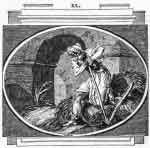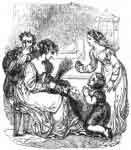Corn complained to the Thresher about the abuse given. The Thresher reminded the Corn that it was only through his action that the Corn had value.
Know why things are happening.

JBR Collection
It once happened that an Ear of Corn, which lay under the heavy blows of a Thresher’s flail, thus expressed its sense of the unaccountable hard treatment: “How have I deserved this severe persecution? Do I not appear before you in the simple covering with which Nature has endowed me; and although mankind freely acknowledge me as their greatest blessing, you treat me as if I had been their curse.” “Fool that thou art!” replied the Thresher, when he heard the complaint; “know that by this very treatment your value and your power of blessing is infinitely increased, and that by it you are divested and freed from a worthless excrescence, and are made more pure.”

Northcote
[Note: The Northcote fable is the same fable as in the JBR Collection above. Only the illustrations and Application associated with the fable in the Northcote book are displayed here.]
Application
Punishments inflicted with discretion, and by the hands of wisdom and justice, become wholesome correction. It is only wanton acts of useless cruelty that stamp the tyrant. But as mere cruelty is of all human crimes the most detestable, so a just coercion is of eminent utility; and some of the hardships of which we complain are not so much the effect of tyranny in others as of our own deserts; and many stubborn spirits are obliged to be driven by severity to their duty, not having virtue enough to perform it of their own free will. Whoever would judge aright of the harsh treatment which some appear to suffer, must not only regard the temper of those who inflict the punishment, but also the qualities of those who complain of it. The idle we know are always punished naturally by poverty or disease, and we know also that nothing but force will make them active and industrious.
The Scripture says, “He who spares the rod spoils the child.” J. N.

